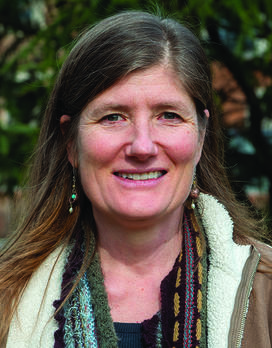From the Editor: Taking on Climate Change

You may be apathetic or even terrified about climate change. You may believe nothing can be done. In this issue of PAW, we aim to set aside those feelings and examine how Princeton and the alumni community are working the problem.
From plasma to poetry to heat pumps, alumni, scientists, students, faculty, and administrators are tackling the effects of climate change across a broad spectrum. Shana Weber sees it every day as the University’s founding director of the Office of Sustainability, working to help Princeton reach net-zero carbon emissions by 2046, or “sooner,” she says.
“The sense of urgency feels different now than it did when I was an undergrad or even 10 years ago with Princeton students,” Weber says. “The acceleration of climate change is so much faster than anyone thought, so it’s a question of how will we adapt?”
Princeton is a testing ground for this. The move to net-zero and increased sustainability measures can be seen and felt throughout campus. There’s the small: electric buses, composting, and stormwater management. And the big: solar panels that provide 20% of electricity, construction of a massive geoexchange system, and developing offshore wind power.
This isn’t only intended to make the University a more sustainable place, but to serve as a model for larger communities.
“There’s a lot of interest in how we’re navigating these changes,” Weber says. “Policymakers are paying close attention because they’re trying to figure out how to incentivize more of it. We take every opportunity to share what we’ve learned.”
Students are also a part of the equation, contributing as part of what’s called “campus-as-a-living-lab.” For example, low-carbon concrete was used to build the new Stadium Drive Garage, and students installed sensors into the concrete as it was poured to track its effectiveness and the building’s structural health over time.
Those are some of the physical changes at Princeton. There’s also groundbreaking research and teaching that is producing alumni who are fighting climate change. These classes and projects can be found in virtually every corner of the University, from the sciences to the liberal arts and beyond.
And then there are activists who are pressing for even greater urgency and accountability. Some work at nonprofits, think tanks, and other universities. Some are students and alumni who want to make a difference, and a good number of them have coalesced around Divest Princeton’s mission, which is to see Princeton fully divest and cut ties with all fossil-fuel companies, specifically BP.
This activism can get messy and distract from the big-picture work at Princeton. But climate change needs accountability and attention, and not just from the scientists or researchers.
“I do have moments of frustration with the very human slow reaction-time to what some call the ‘creeping catastrophe’ of climate change, but I am also heartened by the listening, passion, problem-solving, and activism students are practicing,” Weber says. “In other words, I may not agree with all proposed strategies, but I so believe in the practices of civil disagreement and questioning.”
We hope this issue of PAW provides some insight into the complex web of climate change issues and the impact Princeton and alumni are having.
“Climate change is here. The world is dealing with it,” says Weber. “You have to hold that knowledge at bay a little bit and focus on the long view so you can do
the work.”









2 Responses
Kerry Brown ’74
2 Years AgoThe Impact of Climate Policies
The opening quote from sustainability czar Shana Weber — “… I so believe in the practices of civil disagreement and questioning” — buoyed my hopes. Yet PAW’s Climate Issue raised no questioning of existential climate threats, despite evidence that climate models have “pervasive warming bias” per NASA/NOAA collaborators John Christy, Roy Spencer, et al. (American Geophysical Union’s Earth and Space Science, September 2020 issue). There was no mention of cold killing more people than heat (“Climate and health: mortality attributable to heat and cold,” The Lancet, May 20, 2015) or CO2 increasing crop yields (CO2Coalition.org).
To PAW’s premise that one “may be apathetic or even terrified about climate change,” there is another group. Many are terrified of climate doomsdayists’ harmful policies upon our economies and our poor. Those in the world huddled around charcoal fires are serving a (short) life sentence. Insufficient attention was given to conflict mineral mining, labor and environmental harm in the manufacturing of renewable equipment, skyrocketing energy costs per Europe’s experience, geopolitical instability (Russia/Ukraine/China), and the impact of renewables on wildlife.
Princeton can afford renewables, but most on this planet can’t. Even our university has expensive gas turbine backup for its renewables. In the long-term, nuclear power is backed by smart people such as Bill Gates and Elon Musk. Nuclear power is not intermittent and is safe. See Mike Shellenberger’s TEDx talks.
At Reunions come hear Dr. Patrick Moore, former president of Greenpeace Canada, Princeton’s Dr. William Happer *64, and others at Lewis Library room 138, May 27 at 11 a.m. Or view via Zoom and the University’s Media Central Live site.
Frank Strasburger ’67
2 Years AgoPAW Has Outdone Itself
Inasmuch as I couldn’t resist a submission to the Inbox immediately after I finished reading Bing Lin’s lyrical piece on the Princeton Fox, you’re not likely to print this addition comment from me. But as I went on to make my way through the rest of this remarkable history-making issue, I was astonished at its breadth, its depth, the nuanced way it presents both the University’s powerful and far-reaching research in support of climate change mitigation and Princeton’s complicity in the causes of climate change itself. Never in my 60 years of reading this magazine can I recall so fine a focus on a single topic. A locomotive is due PAW’s new editor, Peter Barzilai s’97, the staff, and all this month’s contributors.